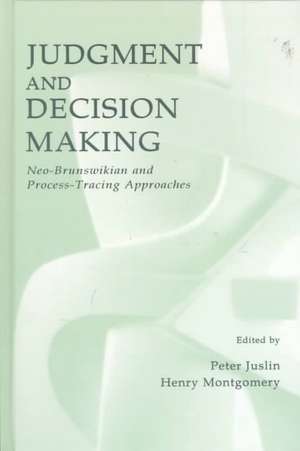Judgment and Decision Making: Neo-Brunswikian and Process-Tracing Approaches
Autor Peter Justin Editat de Peter Juslin, Henry Montgomeryen Limba Engleză Hardback – 31 iul 1999
It is interesting to note that Swedish research on judgment and decision making made an early departure from this dominating mainstream tradition, albeit in two different ways. The Neo-Brunswikian research highlights the relationship between the laboratory task and the adaptation to a natural environment. The process-tracing approach attempts to identify the cognitive processes before, during, and after a decision. This volume summarizes current Swedish research on judgment and decision making, covering topics, such as dynamic decision making, confidence research, the search for dominance structures and differentiation, and social decision making.
Preț: 955.62 lei
Preț vechi: 1165.38 lei
-18% Nou
Puncte Express: 1433
Preț estimativ în valută:
182.85€ • 191.43$ • 151.30£
182.85€ • 191.43$ • 151.30£
Carte tipărită la comandă
Livrare economică 07-21 aprilie
Preluare comenzi: 021 569.72.76
Specificații
ISBN-13: 9780805832549
ISBN-10: 0805832548
Pagini: 352
Dimensiuni: 161 x 234 x 27 mm
Greutate: 0.74 kg
Ediția:New.
Editura: Psychology Press
ISBN-10: 0805832548
Pagini: 352
Dimensiuni: 161 x 234 x 27 mm
Greutate: 0.74 kg
Ediția:New.
Editura: Psychology Press
Cuprins
Contents: P. Juslin, H. Montgomery, Introduction and Historical Remarks. Part I:Judgment and Decision Making in an Environmental Context. B. Brehmer, Reasonable Decision Making in Complex Environments. A. Jansson, Goal Achievement and Mental Models in Everyday Decision Making. G. Rigas, B. Brehmer, Mental Processes in Intelligence Tests and Dynamic Decision Making Tasks. P. Juslin, H. Olsson, Computational Models of Subjective Probability Calibration. A. Winman, P. Juslin, "I Was Well-Calibrated All Along": Assessing Accuracy in Retrospect. Part II:Judgment and Decision Making as Mental Processes. C.M. Allwood, P.A. Granhag, Feelings of Confidence and the Realism of Confidence Judgments in Everyday Life. H. Montgomery, H. Willén, Decision Making and Action: The Search for a Good Structure. O. Svenson, Differentiation and Consolidation Theory: Decision Making Processes Before and After a Choice. T. Gärling, N. Karlsson, M. Selart, The Role of Mental Accounting in Everyday Economic Decision Making. L. Sjöberg, Attitudes, Values, and Opinions: Models and Dynamics. Part III:Judgment and Decision Making in a Social Context. A. Biel, D. Eek, T. Gärling, The Importance of Fairness for Cooperation in Public-Goods Dilemmas. M. Selart, D. Eek, Contingency and Value in Social Decision Making. S. Hemlin, (Dis)Agreement in Peer Review. Part IV:Commentaries. K.R. Hammond, Mats Björkman and Swedish Studies of Judgment and Decision Making. B. Fischhoff, Well-Calibrated Claims About Difficult Questions.
